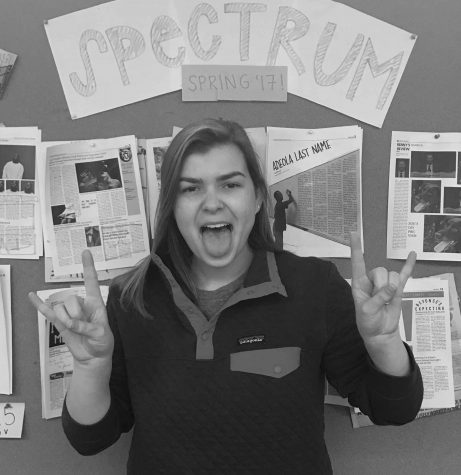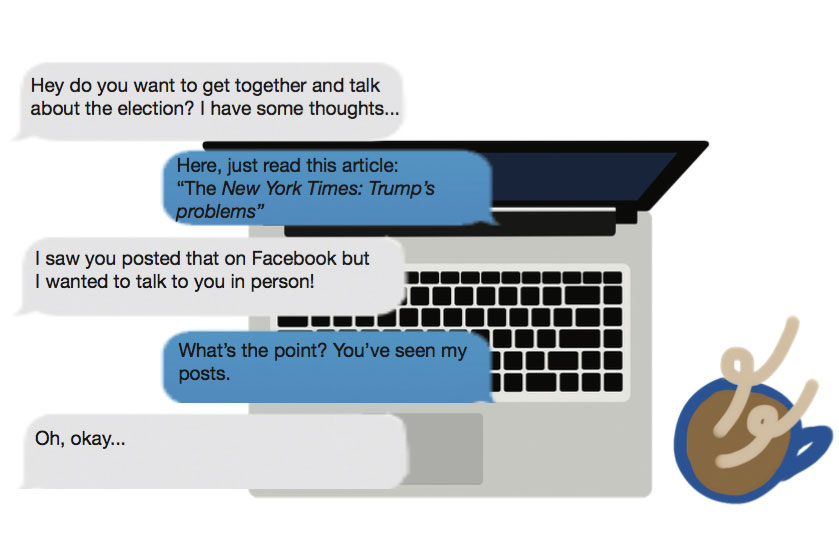Search on Facebook: Empathy
Hipsterism linked to empathy and distance
According to Lee, hipers tend to elude talking in person and resort to technological communcation, preventing empathetic connection.
Hipsterism is, in one light, a subset of popular culture defined by polaroid cameras, cold brew coffee from local coffee shops, skinny jeans, and beards. In another light, though, hipsterism is a dangerous influence on young adults in their navigation of how to be empathic. It creates distance and polarization, and is problematic in its creation of echo chambers in society.
Dr. Joseph Lee, Youth Continuum Medical Director at the Hazelden Betty Ford Foundation, came to speak to the upper school on November 2. He has dedicated his career to helping teenagers understand and recover from substance abuse. Lee has also studied the link between hipsterism and empathy.
Lee was able to speak to me about this connection and why it’s important that teens are aware of how dangerous hipsterism can be. To Lee, “The spirit of hipsterism is not really knowing or understanding something fully, but knowing enough on the surface to pass like you have expertise in it.”
This is dangerous because when people feel they are right and justified in their beliefs, they lose sight of empathy in the race to be right. “Information gives people a false confidence that they really know something deeply or more intimately than they really do. And, then, as a result, they start to lose empathy for other people with ‘wrong’ perspectives,” he says.
With this new information age, people, especially young people, are more informed than they ever have been. Being informed is good, but it creates a tension between being right and being empathetic.
Lee says, “Justice is certainly needed, but the more we beat that drum, we sometimes forget how we deliver that justice.” It’s important to fight for justice, but it is equally important to extend empathy to people who we feel are “wrong.”
In turn, hipsterism and social media have left our generation incredibly distanced from each other. Even though we might fight for justice and what is right, we fail to become closer together and fight as a group of people rather than singularly from screens.
“[Teenagers] have experienced this [distance] in social media where there’s a lot of information but somehow instead of bringing people closer together, there’s a lot of miscommunication and jumps to conclusions,” Lee says.
It is our job, then, to invite conversation in real life and discuss our differences rather than share articles and posts from others in a passive way. It is our initiative to take in creating a world where discussion is able to happen.
In recent events, this distance and lack of empathy has become incredibly clear. After the presidential election, many people felt blindsided by the results and flocked to social media to express their confusion. Both groups, whether confused and upset or content and excited, began to judge the other. In pointing fingers, we avoided actually having conversations and extending empathy.
Lee says, “We may be very right about our perspective but we still have to try to walk in other peoples’ shoes to connect,” he continues, “It’s about how we go about being right rather than if are we right.”
It’s becoming more and more important in the growing popularity of social media that we have the ability to take a step back, empathize, and be able to have productive conversations about different perspectives.
Social media already tailors what we see to what we like, creating homologous groups and echo chambers that are perhaps more subconscious. We lose empathy, then, for anyone outside of those groups as it is nearly impossible for us to fathom that perspective. Lee explains, “When people have different political views, they can’t even imagine what the other side is like.”
This is incredibly dangerous because we are putting on blinders for other perspectives and avoiding confronting the inevitable fact that there will be people who disagree with us. If we remain in the echo chambers that we have built and fail to reach outside of our groups, we begin to take on a mob mentality and avoid any challenges to our ideas.
Lee says, “I am hopeful,” though, for a future ability to have real, honest conversations and close the gap between polarized sides.
It will take empathy, grace, and humility to bridge this gap, through, which I know we are capable of. I challenge each of you to exhibit these traits in your confrontation of people who do not share your opinions, as it is becoming more and more necessary that these conversations happen in order to live in a society in which fighting is not the norm.
Enjoy your cold press, grow a beard, but, please, be empathetic.

Hello! It's me, your trusty Editor-in-Chief. I have been an editor since the spring of my Sophomore year, and I haven't looked back since. I have edited...







